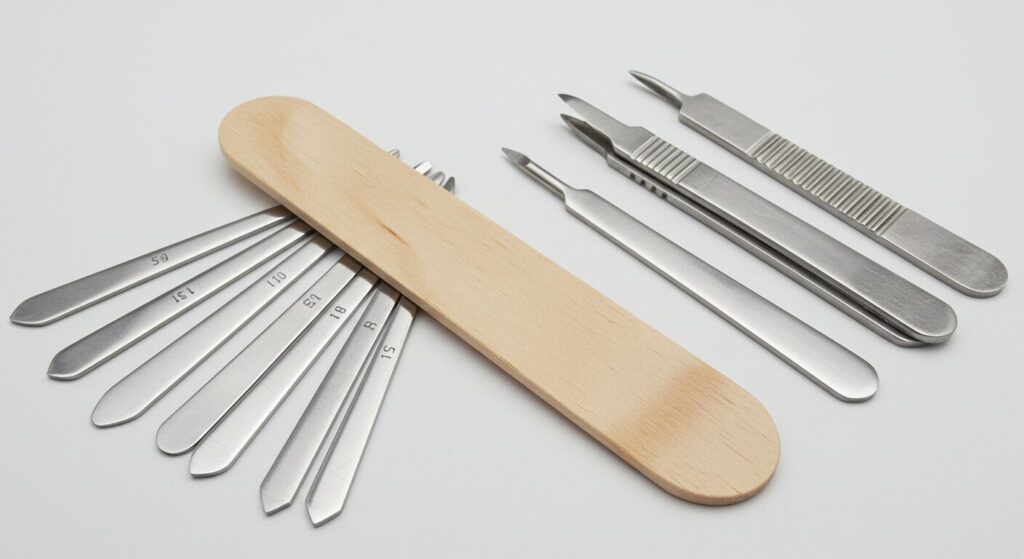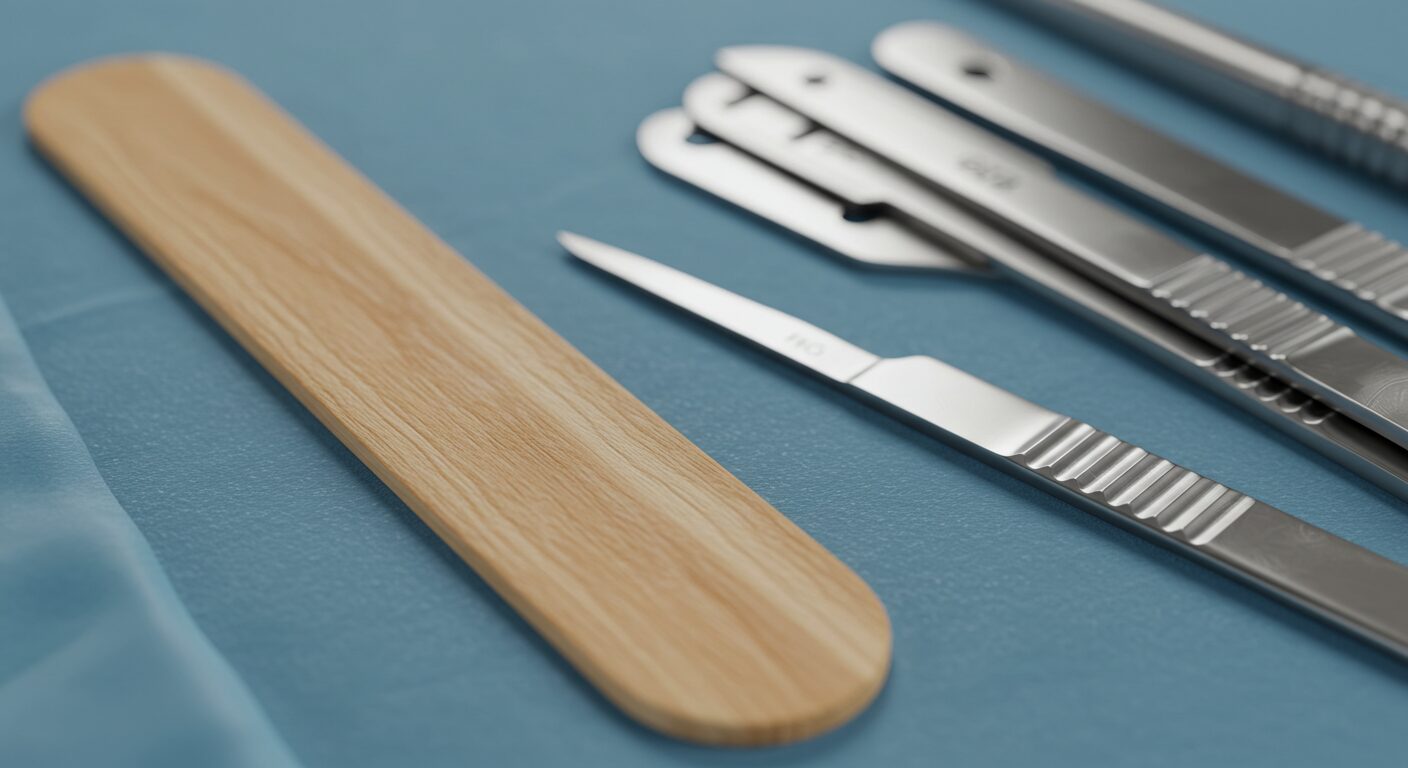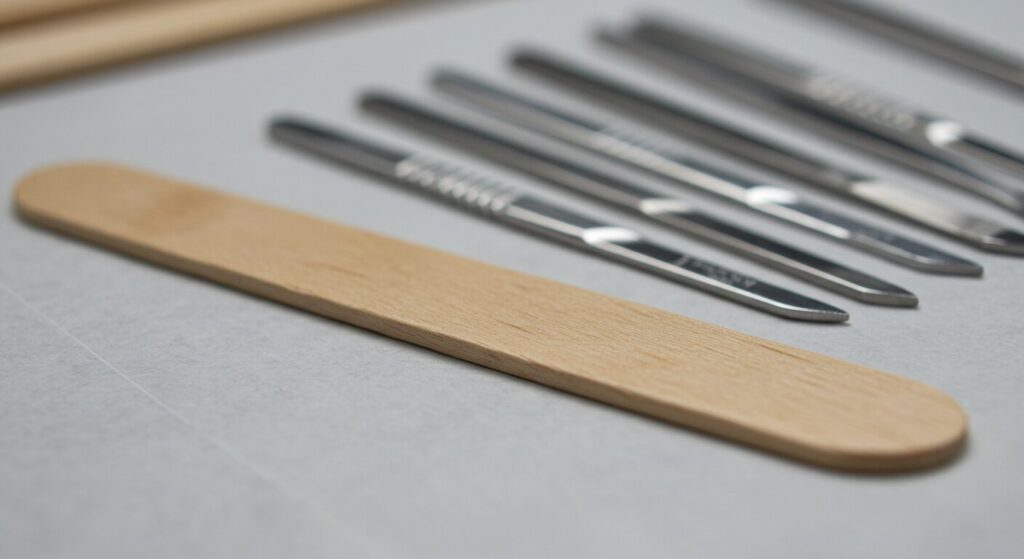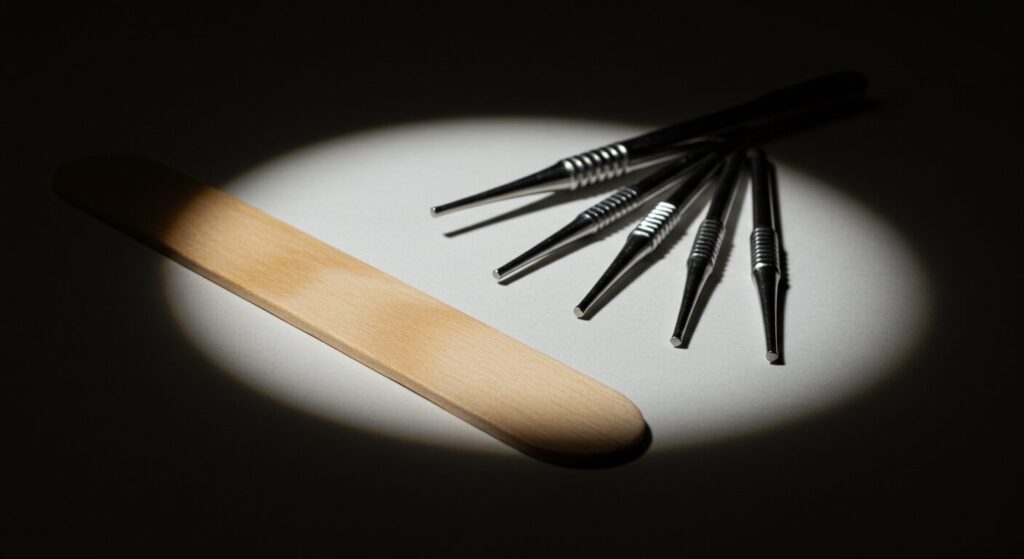Tongue depressors are common in medical and dental offices, but have you ever stopped to think about their importance?
In this article, we’ll take a closer look at the tongue depressor, exploring its definition and purpose, the different types of tongue depressors available, their various uses in medical and dental settings, and the benefits they provide to healthcare professionals and patients.
By examining these aspects of the tongue depressor, we’ll gain a deeper understanding of this humble tool and its crucial role in modern healthcare.
What is a tongue depressor?
A tongue depressor is a medical instrument used to depress the tongue and inspect the oral cavity, particularly the throat, tonsils, and teeth.
It is a simple, yet essential tool used by healthcare professionals, including doctors, dentists, and nurses, to diagnose and treat various oral and throat conditions.
Tongue depressors have been used for centuries in various forms. The earliest recorded use of tongue depressors dates back to ancient Greece and Rome, where physicians used wooden or metal instruments to inspect the oral cavity.
Over time, the design and materials used to make tongue depressors have evolved, with modern tongue depressors typically made from plastic, wood, or metal.
Types of Tongue Depressors
There are several types of tongue depressors available, each with its unique features and uses. Some common types of tongue depressors include:
1. Disposable Tongue Depressors
These are made from plastic or wood and are designed for single use. They are ideal for use in medical settings where infection control is a priority.
Disposable tongue depressors are also convenient for use in emergencies or when a tongue depressor is needed quickly. They are also cost-effective, as they eliminate the need for sterilization and maintenance. Disposable tongue depressors can also reduce the risk of cross-contamination and infection.
2. Reusable Tongue Depressors
These are made from metal or durable plastic and can be sterilized and reused multiple times. Reusable tongue depressors are ideal for use in medical settings where infection control is a priority, but where the tongue depressor will be used repeatedly.
They are also more environmentally friendly than disposable tongue depressors, as they reduce waste and minimize the need for single-use plastics. Reusable tongue depressors can be more cost-effective in the long run, as they eliminate the need for frequent replacements.
3. Flexible Tongue Depressors
These are made from flexible plastic or silicone and are designed for use on patients with sensitive mouths or gag reflexes. Flexible tongue depressors are ideal for use on pediatric or geriatric patients, or patients with oral anxiety or phobias.
They are also useful for patients with oral injuries or conditions, such as oral cancer or dental work. Flexible tongue depressors can also be used to inspect the oral cavity without causing discomfort or anxiety.
4. Illuminated Tongue Depressors
These have a built-in light source that illuminates the oral cavity, making it easier to inspect the throat, tonsils, and teeth.
Illuminated tongue depressors are ideal for use in low-light environments, such as emergency rooms or ambulances. They are also useful for inspecting the oral cavity in patients with dark or pigmented oral mucosa.
Illuminated tongue depressors can help reduce eye strain and improve visibility during oral examinations.
What are Wooden Tongue Depressors?
Wooden tongue depressors are a type of tongue depressor made from wood. They are typically made from a single piece of wood, such as birch or beech, and are designed to be used as a disposable or reusable medical instrument.
Advantages of Wooden Tongue Depressors
Here are some advantages of wooden tongue depressors:
1. Eco-friendly: Wooden tongue depressors are a more eco-friendly option compared to plastic tongue depressors. They are biodegradable and can be composted, reducing waste and minimizing environmental impact.
2. Cost-effective: Wooden tongue depressors are often less expensive than plastic tongue depressors, making them a cost-effective option for medical professionals and healthcare facilities.
3. Smooth surface: Wooden tongue depressors have a smooth surface that is gentle on patients’ tongues and mouths.
4. Easy to sterilize: Wooden tongue depressors can be easily sterilized by autoclaving or disinfecting with a solution.
Disadvantages of Wooden Tongue Depressors
Here are some disadvantages of wooden tongue depressors:
1. Limited durability: Wooden tongue depressors are more prone to breakage and wear and tear compared to plastic tongue depressors.
2. May splinter: Wooden tongue depressors may splinter or crack if not handled carefully, which can be a concern for patients and medical professionals.
3. May not be suitable for all patients: Wooden tongue depressors may not be suitable for patients with certain medical conditions, such as oral thrush or gum disease, as they may be more prone to splintering or breaking.
Wooden tongue depressors are a cost-effective, eco-friendly, and smooth-surfaced option for medical professionals and healthcare facilities. However, they may have limited durability and may not be suitable for all patients. The choice between wooden and plastic tongue depressors depends on individual preferences and needs.
Uses of Tongue Depressors
Tongue depressors have a variety of uses in medical and dental settings. Some common uses of tongue depressors include:
1. Inspecting the Oral Cavity: Tongue depressors are used to depress the tongue and inspect the throat, tonsils, and teeth. This is an essential part of any oral examination, as it allows healthcare professionals to diagnose and treat various oral and throat conditions.
2. Diagnosing Oral and Throat Conditions: Tongue depressors are used to help diagnose conditions such as tonsillitis, strep throat, and oral thrush. They are also used to inspect the oral cavity for signs of oral cancer, dental caries, and other oral health conditions.
3. Administering Medications: Tongue depressors can be used to administer medications, such as lozenges or sprays, to the back of the throat. This is particularly useful for patients with sore throats or oral infections.
4. Taking Oral Cultures: Tongue depressors can be used to take oral cultures, which are used to diagnose infections such as strep throat. This involves gently rubbing the tongue depressor against the tonsils or throat to collect a sample of oral secretions.
5. Assisting with Dental Procedures: Tongue depressors can be used to assist with dental procedures, such as dental extractions or oral surgery. They can be used to depress the tongue and provide access to the oral cavity.
Benefits of Tongue Depressors
Tongue depressors offer several benefits in medical and dental settings. Some of the benefits of using tongue depressors include:
1. Improved Diagnosis: Tongue depressors allow healthcare professionals to inspect the oral cavity and diagnose conditions more accurately. This can lead to more effective treatment and better patient outcomes.
2. Increased Patient Comfort: Tongue depressors can help reduce patient discomfort and anxiety during oral examinations. This is particularly important for patients with oral anxiety or phobias.
3. Reduced Risk of Infection: Disposable tongue depressors can help reduce the risk of infection in medical settings. They are designed for single use and are typically made from sterile materials, reducing the risk of cross-contamination and infection.
4. Cost-Effective: Tongue depressors are a cost-effective tool for healthcare professionals. They are inexpensive to purchase and can be used multiple times, making them a valuable investment for any medical or dental practice.
5. Easy to Use: Tongue depressors are easy to use, even for healthcare professionals who are new to using them. They are simple to maneuver and require minimal training to use effectively.
6. Versatile: Tongue depressors are versatile and can be used in a variety of medical and dental settings. They are ideal for use in hospitals, clinics, dental offices, and other healthcare facilities.

7. Reduces Anxiety: Tongue depressors can help reduce anxiety and stress in patients during oral examinations. By allowing healthcare professionals to inspect the oral cavity quickly and easily, tongue depressors can help reduce the discomfort and anxiety associated with oral examinations.
8. Improves Patient Care: Tongue depressors can help improve patient care by allowing healthcare professionals to diagnose and treat oral and throat conditions more effectively. By providing a clear view of the oral cavity, tongue depressors can help healthcare professionals identify potential health problems early, reducing the risk of complications and improving patient outcomes.
9. Enhances Diagnostic Accuracy: Tongue depressors can help enhance diagnostic accuracy by providing a clear view of the oral cavity. This can help healthcare professionals identify potential health problems early, reducing the risk of misdiagnosis and improving patient outcomes.
10. Supports Preventive Care: Tongue depressors can help support preventive care by allowing healthcare professionals to inspect the oral cavity regularly. This can help identify potential health problems early, reducing the risk of complications and improving patient outcomes.
Conclusion
Tongue depressors are a simple, yet essential tool used in medical and dental settings. They offer several benefits, including improved diagnosis, increased patient comfort, reduced risk of infection, and cost-effectiveness.
Whether you’re a healthcare professional or a patient, understanding the uses and benefits of tongue depressors can help improve oral health and overall well-being. At Clinicaid.com.ng, we offer a range of tongue depressors and other medical instruments to meet your needs. Visit our website today to explore our collection and find the perfect tongue depressor for you.

Digi Clinicaid Nigeria Ltd is an online medical marketplace in Nigeria.








